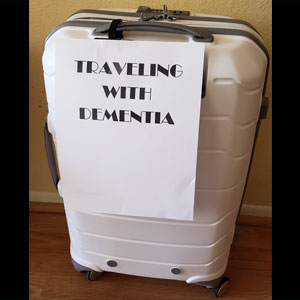 I am repeatedly asked for advice on whether or not to take loved ones with dementia on vacation. My answer is always consistent, “It’s always better if they are still in the early to moderate stage of the disease. If they are “too far” advanced, the problems you will encounter may be very severe. Once they enter the latter stages, the safe haven of their homes may honestly be the best place for them. At this point you may want to consider what is now called a “Staycation.”
I am repeatedly asked for advice on whether or not to take loved ones with dementia on vacation. My answer is always consistent, “It’s always better if they are still in the early to moderate stage of the disease. If they are “too far” advanced, the problems you will encounter may be very severe. Once they enter the latter stages, the safe haven of their homes may honestly be the best place for them. At this point you may want to consider what is now called a “Staycation.”
What I’m hearing the most from family caregivers is, “This will most likely be our last trip together.” Living here in Florida, care providers are constantly telling me, they’re planning a 5-7-day cruise.
Those that have opted to not heed my advice and that from others, have almost certainly come home telling me that everything that could have possibly gone wrong did!
Let me describe what happened to a certain gentleman. He went against the advice of several dementia-caring professionals and decided to take his wife across a multi-state road trip to visit his son. Not even making it out of the state of Florida, he started running into difficulties. They began with having to make frequent stops so his wife could use the rest room and attempting to bring down his wife’s anxiety levels which seemed to be intensifying by the mile. He pulled into a well-lit truck stop, reckoning it would be safe since it was populated. After waiting for about 15 minutes for his wife to come out of the restroom, he decided he’d better knock on the door and check on her. She finally opened the door and he gently reached out for her hand to lead her back to their car. At this point his wife started screaming at the top of her lungs. The next thing this man knew, he was surrounded by people and thrown to the ground and held there until security arrived. Meanwhile, she was telling everyone that she had no idea who he was and that he had kidnapped her. The police arrived and handcuffed this man—and charged him with a major felony. This left absolutely no one that understood how to properly care for this poor woman.
Embarrassed, broken and defeated he finally convinced the police to call his son, who was a day and a half away, to come get his mother. Three times that man had to travel hours north to that rural town for court appearances. The devastation and turmoil this family went through may never heal.
I know that there will be times when you have absolutely no choice and you all have to go somewhere. Funerals or other drastic events may come into play. However, think deeply and hard before you start stripping a loved one away from his or her daily routine so desperately needed in the late stages of dementia.
I personally experienced a similar but less disastrous situation during a 12-day trip to Canada with my dad who had lived with Alzheimer’s disease. There wasn’t a bathroom throughout the whole trip that my father could find his way out of on his own. It wasn’t until that trip that I truly realized how advanced in the disease of Alzheimer’s my father really was. I had been kidding myself, living in denial, believing he truly wasn’t all that bad.
If you want to do some traveling, my advice is to go early while both of you can still enjoy it. Because once the disease starts winning, and it will, loving them in the comfort and security of their own homes may actually be the best vacation possible.
If you do travel, and you’re traveling by plane, when making your reservations, I would list your loved one as a passenger with disabilities. If you are prompted to ask what type, just tell them there is a cognitive disorder. I have personally talked with many of my friends living with dementia—they have told me that the airlines have helped them immensely. With the extra-long lines today due to security checks, take whatever assistance that is available to you and your loved one.
If you’re traveling across many different time zones, you may want to consider keeping medication times the same as his or her home routine. You can set different alarms on your cell phone to assist you. This will help everyone get settled back in when you return home, for this could bring on another whole set of difficulties.